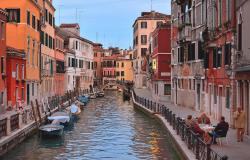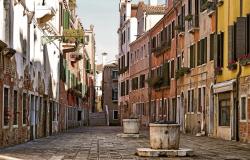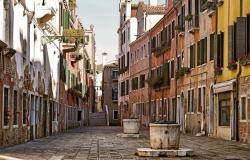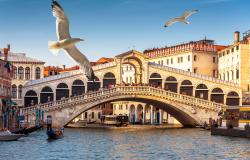 A previously unseen interview with Pier Paolo Pasolini shot just months before his murder has been incorporated into a new documentary about the cult director and intellectual to be screened at the Venice Film Festival.
A previously unseen interview with Pier Paolo Pasolini shot just months before his murder has been incorporated into a new documentary about the cult director and intellectual to be screened at the Venice Film Festival.
The documentary by Italian filmmaker Giuseppe Bertolucci merges the interview with photos taken in June 1975 on the set of Pasolini's last film, the highly controversial Salo' o le 120 Giornate di Sodoma (Salo' or the 120 Days of Sodom).
Bertolucci, brother of the Oscar-winning Bernardo, said the result was almost like watching Salo' with running commentary from Pasolini above it.
"Often the photographic images and sequences reflect exactly what Pasolini is saying in the interview," Bertolucci said.
The original interview was filmed by American documentary-maker and film critic Gideon Bachman, a close friend of Federico Fellini, while the photos of the making of Salo' were taken by Bachman's companion Deborah Imogen Beer. Bertolucci said Beer's images, which number in their
thousands, were faithful replicas of Pasolini's own shots and angles during filming.
"They are remarkable documents," he said.
As for the interview, he said Pasolini's relaxed and easy body language was at odds with the "total pessimism and desperation" expressed in his words.
"The interview sums up Pasolini's thoughts in the last few years of his life in all their negativity," he said. Five months after the interview, Pasolini's battered body was discovered on waste ground outside the seaside town of Ostia near Rome. A young male prostitute was subsequently arrested for his murder.
Salo' is considered one of the most controversial movies ever made, and by some one of the most disturbing. The film is loosely based on the Marquis de Sade's notorious book The 120 Days of Sodom, with the setting transplanted to the last years of World War II and Benito Mussolini's Nazi puppet state of Salo' in northern Italy.
With explicit scenes of torture and sexual abuse, the film linked Fascism with sadism and was banned virtually everywhere.
Pasolini, whose previous films had already generated scandals, told Bachman that "Salo' goes so far beyond the limits that those who habitually speak badly of me will have to find new terms".
Born in Bologna in 1922, Pasolini's first film was Accattone which came out in 1961.
With its violent depiction of the life of a male pimp in the slums of Rome, the film caused an instant sensation.
His next film, Mamma Roma, also made waves with its portrayal of a middle-aged whore in Rome played by Anna Magnani.
But another of his earlier films, the black-and-white 1964 Il Vangelo Second Matteo (The Gospel According to St. Matthew) was made with the Catholic Church's support and is hailed by many critics as the best cinematic adaptation of the life of Jesus.
Pasolini's later movies were sex-laden adaptations of classics such as Il Decameron (The Decameron, 1971), I Racconti di Canterbury (The Canterbury Tales, 1972) and Il Fiore delle Mille e una Notte (Arabian Night, 1974). The director also wrote critically acclaimed novels and
poetry.
His first book Ragazzi di Vita, published in 1955, resulted in obscenity charges being brought against him and was denounced by the Vatican and the Italian Communist Party, of which Pasolini was a member.
Attempts to prosecute Pasolini for the book failed and it ended up as a finalist for the Strega Prize, Italy's leading literary award.
Bertolucci said Pasolini had been a "prophet" and that "listening to him now is like hearing him talk about our times instead of 20 years ago".
"He was able to see things which others couldn't see but were nonetheless there - his wariness of the power of television, consumer society and his analysis of youth," he said.
Bertolucci's documentary Pasolini Prossimo Nostro will be given a special screening at Venice on September 8. An hour and 50 minutes long, the film is based on 50 hours' worth of interview material, 3,000 metres of negative film and 7,200 photos.
Meanwhile, the circumstances surrounding Pasolini's death remain a mystery.
He was killed by being run over several times with his own car.
Pino Pelosi, a rent-boy at the time, was caught by police at the wheel of Pasolini's blood-smeared car and immediately confessed to murdering
Pasolini.
But last year, Pelosi retracted his confession, saying Pasolini was beaten to death by a group of thugs who wanted to "teach him a lesson".
Pelosi, now in his late 40s and out of jail, said he had decided to "tell the truth" because his parents were no longer alive and could therefore could not be the victims of retaliation by those who actually killed the director.
Magistrates subsequently reopened their files on the murder but shelved the case last November saying they had found no new evidence.
Pasolini's friends, colleagues and admirers have never accepted the theory that Pelosi acted alone. Many are adamant that he was murdered for the radically "dangerous" political views, expressed in his novels, books and newspaper editorials.









